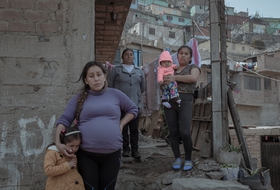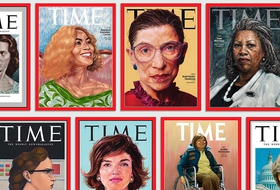
One in three women have suffered physical or sexual violence. With contributions from Europe, Africa, Asia and Latin America, we look at how this shadow pandemic affects every corner of the world.
Could a seemingly innocuous object like a bicycle contribute to triggering a revolution? This is the question that the website of the documentary Voglio una ruota (I want a wheel) is asking itself, because the invention of bicycles, besides facilitating the right to mobility, encouraged women’s emancipation between the nineteenth and twentieth century. Voglio una ruota is
Could a seemingly innocuous object like a bicycle contribute to triggering a revolution? This is the question that the website of the documentary Voglio una ruota (I want a wheel) is asking itself, because the invention of bicycles, besides facilitating the right to mobility, encouraged women’s emancipation between the nineteenth and twentieth century.
Voglio una ruota is director Antonella Bianco’s project: the story of how bicycles changed women and how women changed bicycles.
It’s a fifty-minute long documentary with mixed technique (illustration and interviews) on women’s emancipation and female cycling. It wasn’t easy for women to stand up against conformism, like when in 1924 Alfonsina Strada decided to race against men in the Giro d’Italia. Today, there is the Giro Rosa (literally pink tour) but women are not recognised as professionals, only as amateurs, as if female cycling was inferior to male cycling. For this reason, there are athletes like Anna Trevisi who fight to gain the deserved recognition and more rights. Not to mention Eyerusalem Dino Keli’s dream, an Ethyopian cyclist who would like to start a career as a cyclist in Italy.
[vimeo url=”https://vimeo.com/112680709″]
Unfortunately, in some countries women are banned from riding a bicycle. Like in Afghanistan and Egypt, where, as reported in Voglio una ruota, a few Egyptian girls of the GoBike group, every day break an unwritten law that considers inappropriate for women to ride a bike.
These are only a few of the motivations that pushed Antonella Bianco to realise such a documentary. In late September, a new crowdfunding campaign will start on Indiegogo to allow the project to spread.
Siamo anche su WhatsApp. Segui il canale ufficiale LifeGate per restare aggiornata, aggiornato sulle ultime notizie e sulle nostre attività.
![]()
Quest'opera è distribuita con Licenza Creative Commons Attribuzione - Non commerciale - Non opere derivate 4.0 Internazionale.
One in three women have suffered physical or sexual violence. With contributions from Europe, Africa, Asia and Latin America, we look at how this shadow pandemic affects every corner of the world.
The Istanbul Convention against gender-based and domestic violence marks its tenth anniversary. We look at what it is, who its signatories are, and what the future might hold.
European Commission President Ursula von der Leyen reminded us of the gravity of violence against women around the world, and of the Istanbul Convention’s utmost importance.
President Erdoğan has pulled Turkey out of the Istanbul Convention, key in the fight against gender violence, claiming that it favours the LGBT community rather than family values.
Violence against women in Peru has increased as a result of Covid-19 lockdowns. 14,912 people were reported missing from January to November 2020, more than half of them minors and 64 per cent women. People have been confined to their homes for months, many forced to endure poor physical, economic and social conditions. A situation that
Joys Estefani Qqueccaño Huamani, 24, disappeared from her rural community in Peru on 9 October. Her family began looking for her independently of the authorities and despite the resistance of relatives of Joys Estefani’s ex-partner Arturo Ccana Condori, 32, charged with committing violence against her on 28 September, eleven days before Joys Estefani disappeared. Photos
Costa Rica celebrated its first same-sex marriage when two women, Alexandra Quiros and Dunia Araya, celebrated their wedding: an “extraordinary moment”.
The pandemic and its restrictions are affecting everyone, without exceptions. However factors like housing, income inequalities, gender, access to technology and working conditions are influencing how people experience the health crisis.
Time magazine’s 100 Women of the Year project sheds light on influential women’s stories, from Amelia Earhart to Greta Thunberg. A selection of some of the greats for International Women’s Day.







